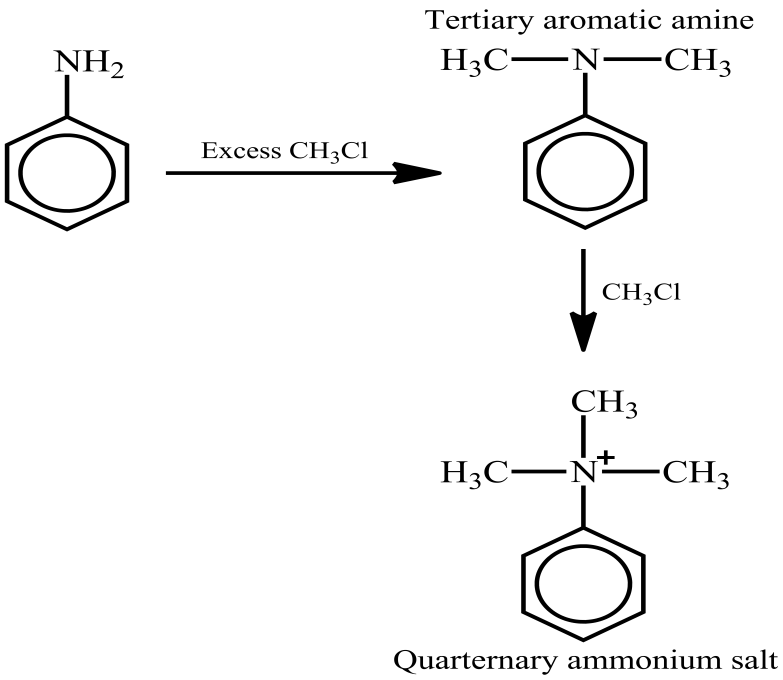
When aniline reacts with excess of alkyl halide, it gives:
A. Amino compound
B. Tertiary compound
C. Azomethane
D. Quaternary ammonium compound
Answer
233.4k+ views
Hint: Aniline is a nucleophile meaning nucleus loving or electron rich species. Again alkyl halide is an electrophile meaning electron loving or an electron deficient species. When aniline reacts with alkyl halide a substitution type reaction takes place.
Complete Step by Step Solution:
A nucleophile is a species which is electron rich and attacks an electrophile. Aniline is a nucleophile due to the presence of high electron density in aniline.
An electrophile is a species which is electron deficient and reacts with a nucleophile. Alkyl halide is an electrophile due to the presence of three strong electron withdrawing halide atoms which attracts its electron and decreases the electron density.
When aniline reacts with alkyl halide a substitution reaction takes place where the halide ion get replaced by $N$ atom of aniline and on addition with excess alkyl halide all the hydrogen atoms and lone pair of $NH_2$ group are replaced by methyl groups and a quaternary ammonium compound is formed as a product. The reaction is as follows:

Thus the correct option is $D$.
Note: Aniline is a basic compound. It acts as a strong base in acidic solution due to high electron density and presence of unpaired electrons on nitrogen atoms of aniline. Again due to high electron density it acts as a nucleophile. Where a nucleophile is an electron dense species and nucleus loving.
Complete Step by Step Solution:
A nucleophile is a species which is electron rich and attacks an electrophile. Aniline is a nucleophile due to the presence of high electron density in aniline.
An electrophile is a species which is electron deficient and reacts with a nucleophile. Alkyl halide is an electrophile due to the presence of three strong electron withdrawing halide atoms which attracts its electron and decreases the electron density.
When aniline reacts with alkyl halide a substitution reaction takes place where the halide ion get replaced by $N$ atom of aniline and on addition with excess alkyl halide all the hydrogen atoms and lone pair of $NH_2$ group are replaced by methyl groups and a quaternary ammonium compound is formed as a product. The reaction is as follows:

Thus the correct option is $D$.
Note: Aniline is a basic compound. It acts as a strong base in acidic solution due to high electron density and presence of unpaired electrons on nitrogen atoms of aniline. Again due to high electron density it acts as a nucleophile. Where a nucleophile is an electron dense species and nucleus loving.
Recently Updated Pages
JEE Main 2023 April 6 Shift 1 Question Paper with Answer Key

JEE Main 2023 April 6 Shift 2 Question Paper with Answer Key

JEE Main 2023 (January 31 Evening Shift) Question Paper with Solutions [PDF]

JEE Main 2023 January 30 Shift 2 Question Paper with Answer Key

JEE Main 2023 January 25 Shift 1 Question Paper with Answer Key

JEE Main 2023 January 24 Shift 2 Question Paper with Answer Key

Trending doubts
JEE Main 2026: Session 2 Registration Open, City Intimation Slip, Exam Dates, Syllabus & Eligibility

JEE Main 2026 Application Login: Direct Link, Registration, Form Fill, and Steps

Understanding the Angle of Deviation in a Prism

Hybridisation in Chemistry – Concept, Types & Applications

How to Convert a Galvanometer into an Ammeter or Voltmeter

Understanding the Electric Field of a Uniformly Charged Ring

Other Pages
JEE Advanced Marks vs Ranks 2025: Understanding Category-wise Qualifying Marks and Previous Year Cut-offs

NCERT Solutions For Class 12 Chemistry Chapter 1 Solutions (2025-26)

Solutions Class 12 Chemistry Chapter 1 CBSE Notes - 2025-26

NCERT Solutions For Class 12 Chemistry Chapter 4 The d and f Block Elements (2025-26)

Biomolecules Class 12 Chemistry Chapter 10 CBSE Notes - 2025-26

NCERT Solutions For Class 12 Chemistry Chapter 10 Biomolecules (2025-26)




